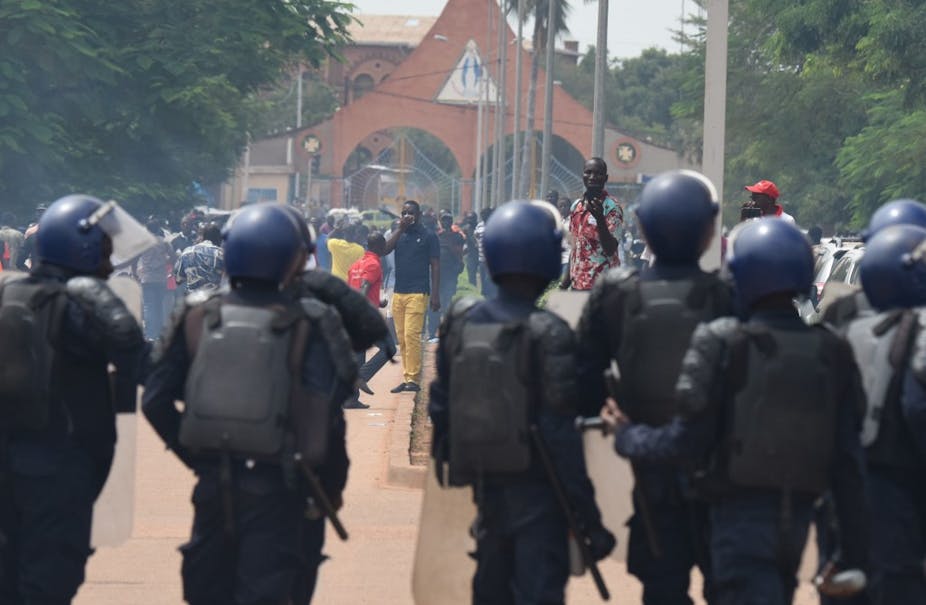
Burkina Faso has been experiencing regular attacks led by armed terrorist groups from neighbouring countries. Surrounded by six countries, it is the northern part bordering Mali and Niger – particularly the Soum province – that has been most affected. And the security situation is only getting worse.
But now the country faces a new terrorist threat. Terrorist groups are also flourishing within its borders.
In 2016, a new Burkina armed terrorist group – “Ansar ul Islam” – claimed responsibility for an attack on the Nassoumbou military post that killed 12 members of the national defense and security forces. Ansar ul Islam was created by Ibrahim Malam Dicko, a preacher from Soum.
The attack marked the start of internal terrorist threats and came as a great shock to the Burkina population. The crisis in the north also has domestic roots. Initially, Ansar ul Islam was a rebel movement, that claimed to speak for the Rimayɓe, the “Fula slaves”. It then became a movement that fought for northern populations that have neither political power nor religious authority.
Unlike the approach taken by some jihadist movements in Mali, Ansar ul Islam didn’t try to take control of part of the country. Rather, it plunged the entire province into widespread violence by using rhetoric based on the fight against social inequality, injustices and poor governance. Its rhetoric – which targets security forces and the state – resonated with people in these areas.
Ansar ul Islam is not the only group sowing violence in the north. Since 2016 the country has been threatened by terrorist groups from Mali, who have found a rich breeding ground in the Sahel region of Burkina Faso. Although they are still using Mali as their home base, they greatly rely on Burkina citizens.
In this part of the country, the Group to Support Islam and Muslims – whose modus operandi involves kidnappings, attacks against state symbols and improvised explosive devices – became a beacon for Ansar ul Islam and other small militant groups. They all saw the advantage of working together.
These small groups can continue their trafficking and criminal activities in peace, with protection from the Group to Support Islam and Muslims. They also receive logistical and technical support, which means they can carry out more complex assaults.
These terrorist groups have mostly set themselves up in rural areas. How can this be explained? And why aren’t they meeting more resistance?
Rural bases
First, the absence of the state is very pronounced in rural areas, allowing criminal groups to flourish. Extremist groups in Burkina are unique in that they do not live in the areas they have conquered, instead remaining remote to take advantage of this.
Rural populations also have a negative view of the government and centralised power. This includes abuse and violence by law enforcement agencies.
In December 2018, a resident of Madjoari, eastern Burkina Faso, said:
“We don’t need the state any more. It’s the state that has radicalised all these young people. They have been chased from their land, starved, or killed. What’s happening now is the response to all these acts of violence committed by the state.”
The more corrupted the environment, the easier it is for violent extremist groups to present themselves as a virtuous alternative by raging against the immorality of the elite in power. Civil servants and security forces are often seen as self-serving, rather than responsible for providing services.
As the same citizen explains:
“We have not seen any security response from the state. The only thing that works here is customs. Both the police and gendarmerie are only around on market days, and then only to demand money from poor vendors.”
The combination of poverty, a lack of public services, security forces’ inefficiency and neighbouring countries’ instability has contributed to the growing radicalisation of civil populations in Burkina Faso.
What’s more, the cruel, degrading treatment and torture of individuals at the hands of the defense and security forces can give rise to a desire for vengeance.
The title of Human Rights Watch’s first report – “During the day we are afraid of the army, and at night of the jihadists” – on Burkina Faso says a lot about this relationship. The more brutal and widespread the methods, the more attractive the violent extremist activities seem, and the more the local communities support these extremist groups.
The facts are clear: on the one hand, the absence of the state provides a fertile breeding ground for terrorist groups; on the other, its presence in certain affected areas helps extremist groups take root and contributes to disturbing local residents.
To fight against the proliferation of terrorist activities and ideology, authorities must profoundly change the relationship that exists between the state and its representatives in the most vulnerable areas.
Mahamoudou Savadogo, Chercheur sur les questions de l’extrémisme violent, Université Gaston Berger
This article is republished from The Conversation under a Creative Commons license.

